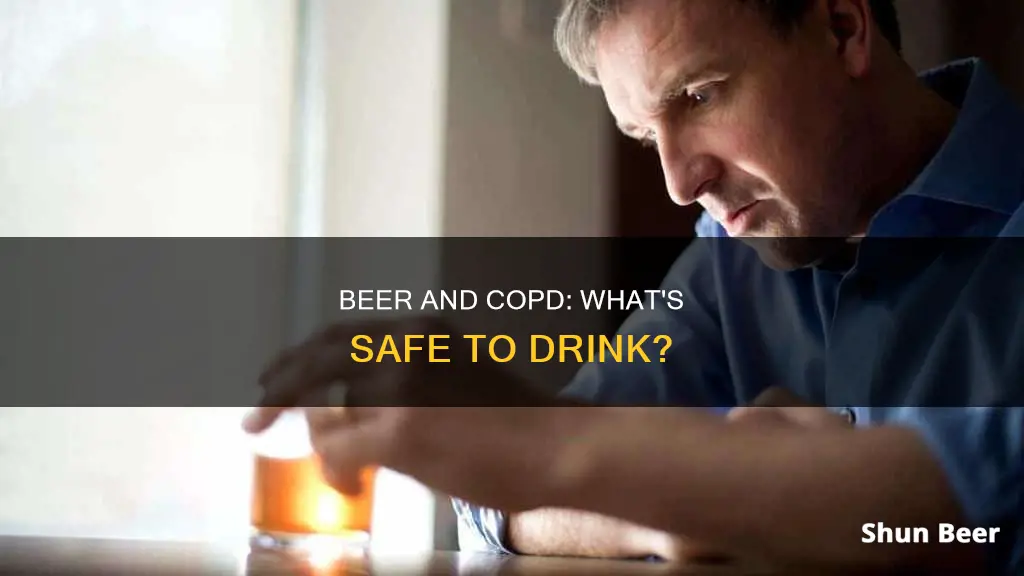
If you have COPD, you may be wondering if it's safe to drink beer. COPD, or chronic obstructive pulmonary disease, is a group of lung diseases that affect your breathing. While alcohol does not directly cause COPD, chronic alcohol exposure can harm your lungs and worsen your condition. Drinking alcohol can impair your breathing abilities, especially if you have lung disease, and can also increase your risk of developing COPD. Additionally, alcohol can interfere with the effectiveness of medications used to treat COPD. So, if you have COPD or are at risk, it's important to consider the potential complications of drinking beer or other alcoholic beverages.
| Characteristics | Values |
|---|---|
| Can alcohol directly cause COPD? | No clear evidence |
| Can alcohol worsen COPD? | Yes |
| Can alcohol cause breathing problems? | Yes |
| Can alcohol negatively impact the lungs? | Yes |
| Can alcohol negatively impact the immune system? | Yes |
| Can alcohol cause inflammation? | Yes |
| Can alcohol cause a deficiency of antioxidants? | Yes |
| Can alcohol impair mucus-clearing ability? | Yes |
| Can alcohol have an effect on heart disease? | Yes |
| Can alcohol have an effect on medication for COPD? | Yes |
| Can alcohol cause liver disease? | Yes |
What You'll Learn
- Alcohol may damage the lungs and body's immune response, making it harder to breathe
- Alcohol can negatively impact the healthy function of the lungs, making it harder to cough
- Alcohol can cause breathing problems by impacting the effectiveness of antimicrobial agents in the airway
- Alcohol can reduce levels of glutathione, an antioxidant that helps protect the lungs from damage
- Alcohol can worsen symptoms of depression in people with COPD

Alcohol may damage the lungs and body's immune response, making it harder to breathe
Alcohol may damage the lungs and the body's immune response, making it harder to breathe. Here's how:
Impact on the Immune System
Drinking alcohol can weaken the immune system, leaving the body vulnerable to infections and diseases. Alcohol has a negative impact on both the innate and adaptive immune systems. The former provides general immunity by responding to viruses, bacteria, and other microorganisms, while the latter governs immune memory, such as recognising previous infections. Even a single session of drinking 5-6 drinks can suppress the immune system for up to 24 hours. Over time, drinking alcohol can lead to longer-term issues as the immune system takes longer to recognise and respond to infections, resulting in more intense and prolonged illnesses.
Impact on the Lungs
The lungs are particularly vulnerable to the effects of alcohol. Excessive drinking can impact the immune cells that protect the lungs, such as neutrophils and alveolar macrophages, which play a crucial role in combatting pulmonary conditions. Alcohol can also affect the mucociliary apparatus, reducing the ability of the airways to remove mucus from the lungs. This can lead to lung tissue damage and a gradual weakening of lung function.
Heavy drinking is associated with a 3-7 times higher risk of developing serious conditions like pneumonia from common respiratory tract infections. This vulnerability is often unnoticed until a severe infection occurs.
Alcohol and COPD
While alcohol does not independently cause chronic obstructive pulmonary disease (COPD), chronic alcohol exposure can worsen the condition and compound respiratory damage caused by toxins like cigarette smoke. Alcohol consumption, even in moderate amounts, can impair breathing abilities, especially for those with lung disease. Alcohol often induces inflammation, impairing the immune system and making individuals more susceptible to infections, including lung infections.
Heavy drinking also causes a deficiency in antioxidants like glutathione, increasing susceptibility to oxidative stress and cellular damage. This can predispose individuals to serious lung diseases when exposed to tobacco smoke, air pollution, dangerous chemicals, or other airway irritants.
Additionally, excessive alcohol use can impair the mucus-clearing ability of the lungs as it harms the cilia that help clear mucus and infectious organisms.
Recommendations
To reduce the risk of alcohol impacting your health, it is recommended to drink in moderation. Abstaining from alcohol or reducing alcohol intake can help slow down the progression of COPD and improve lung function.
Beer and Tramadol: A Risky Mix?
You may want to see also

Alcohol can negatively impact the healthy function of the lungs, making it harder to cough
Alcohol can have a detrimental impact on lung health, and may worsen conditions such as COPD. While alcohol does not independently cause lung diseases, chronic alcohol exposure can harm your lungs and make it harder to cough.
Alcohol is known to induce inflammation, which impairs the immune system. This makes individuals more susceptible to infections, including those affecting the lungs. Additionally, heavy drinking can lead to a deficiency of antioxidants like glutathione, which protect the lungs from damage caused by smoke. This deficiency can make individuals more susceptible to oxidative stress, resulting in cellular damage and an increased vulnerability to serious lung diseases.
Excessive alcohol consumption can also impair the mucus-clearing ability of the lungs. The cilia, which are tiny hair-like structures in the airways, help to clear mucus and infectious organisms. However, alcohol can damage these cilia, leading to a build-up of mucus and an increased risk of infection.
Furthermore, alcohol can negatively impact heart health, which is closely linked to respiratory function. Heart disease can impair breathing and exacerbate the respiratory problems associated with lung diseases like COPD.
The effects of heavy alcohol use on pulmonary function can be temporary or long-lasting, and there is no way to predict when breathing issues will become irreversible. Therefore, it is crucial for individuals with COPD or other pulmonary concerns to examine their alcohol habits and consider reducing their alcohol intake to mitigate the potential negative consequences on their lung health and overall well-being.
Beer and Steroid Shots: Safe Mix or Health Risk?
You may want to see also

Alcohol can cause breathing problems by impacting the effectiveness of antimicrobial agents in the airway
Alcohol can have a detrimental impact on breathing, and this is especially true for those with COPD. While alcohol does not directly cause COPD, it can worsen the condition and compound respiratory damage caused by toxins such as cigarette smoke. Alcohol can induce inflammation, impairing the immune system and making individuals more susceptible to infections, including those of the lungs.
Alcohol can also cause breathing problems by negatively impacting the effectiveness of antimicrobial agents in the airway. Firstly, heavy drinking reduces levels of glutathione, an antioxidant that helps protect the lungs from damage caused by inhaled toxins such as tobacco smoke. This can leave individuals more susceptible to oxidative stress, which can cause cellular damage and predispose them to serious lung diseases.
Secondly, alcohol can impair the body's natural mucociliary transport system, which works to clear mucus and contaminants from the airways. This can be particularly problematic for those with COPD, who often experience excessive mucus production, making breathing difficult.
Thirdly, alcohol can interfere with the effectiveness of medications used to treat COPD, such as glucocorticoids and antibiotics. This can reduce the therapeutic effects of these medications and impact pulmonary function.
Finally, chronic heavy drinking can increase the risk of developing other infections and conditions that affect the lungs and impact breathing, such as pneumonia, tuberculosis, respiratory syncytial virus infection, and acute respiratory distress syndrome.
Therefore, while alcohol does not directly cause COPD, it can worsen the condition and impact breathing by impairing the effectiveness of antimicrobial agents in the airway, increasing susceptibility to lung damage, impairing mucus clearance, interfering with medication effectiveness, and increasing the risk of other lung infections and conditions.
Beer and High Liver Enzymes: Is It Safe to Drink?
You may want to see also

Alcohol can reduce levels of glutathione, an antioxidant that helps protect the lungs from damage
Alcohol can negatively impact the lungs in several ways. One of the main ways is by reducing levels of glutathione, an antioxidant that helps protect the lungs from damage. Glutathione is a principal cellular scavenger of free radicals, and chronic alcohol abuse can induce a decrease in hepatic glutathione.
Heavy drinking can cause a deficiency of antioxidants like glutathione, making the body more susceptible to oxidative stress. This cellular damage can predispose individuals to serious lung diseases, especially when exposed to tobacco smoke, air pollution, dangerous chemicals, or other airway irritants.
The effects of heavy alcohol use on pulmonary function can be temporary or long-lasting, and there is no way to know when breathing issues will become irreversible. Abstaining from alcohol may improve the diffusing capacity of the lungs.
In addition to the direct impact on glutathione levels, alcohol abuse can also lead to impaired mucus-clearing ability. The cilia in the lungs that help clear mucus and infectious organisms can be harmed by excessive alcohol use.
Furthermore, alcohol can induce inflammation, impairing the immune system and making individuals more susceptible to infections, including those of the lungs.
Overall, while alcohol does not independently cause lung diseases like COPD, chronic alcohol exposure can worsen the condition and compound the respiratory damage done by toxins like cigarette smoke.
Drinking Beer While Driving in New Zealand: What's Allowed?
You may want to see also

Alcohol can worsen symptoms of depression in people with COPD
Additionally, alcohol interferes with the body's mucus-clearing ability, further compromising respiratory health. The effects of alcohol on the lungs can be temporary or long-lasting, and there is no way to predict when breathing issues will become irreversible. Abstaining from alcohol may improve lung function and is recommended for those with COPD to slow disease progression.
Furthermore, alcohol interacts with medications commonly used to treat COPD, such as glucocorticoids and antibiotics. Drinking alcohol while taking these medications can reduce their effectiveness and negatively impact overall pulmonary function.
The relationship between alcohol consumption and smoking, a primary risk factor for COPD, is well-established. People with alcohol dependence are more likely to smoke, and those who smoke are more likely to be dependent on alcohol. As a result, it can be challenging to disentangle the individual effects of alcohol consumption on COPD. However, research suggests that alcohol can negatively impact lung function and increase the risk of developing COPD, especially when combined with smoking.
In conclusion, while alcohol may not be the direct cause of COPD, it can worsen the condition and impact overall respiratory health. For individuals with COPD, reducing alcohol consumption or abstaining altogether is advisable to manage their condition and prevent further complications, including symptoms of depression.
CO2 Cartridges: How They Keep Beer Fresh and Carbonated
You may want to see also
Frequently asked questions
Alcohol does not independently cause COPD. However, chronic alcohol exposure can be harmful to your lungs, worsening your condition and compounding the respiratory damage done by toxins like cigarette smoke. If you have COPD, it is best to discuss your options with your healthcare provider.
Alcohol often induces inflammation, impairing your immune system. This makes you more susceptible to all types of infections, including those of the lungs. Heavy drinking also reduces your levels of glutathione, an antioxidant that helps protect your lungs from damage caused by inhaled toxins such as tobacco smoke.
If you have COPD, drinking alcohol may negatively impact your lung function and make it harder to breathe. Alcohol can also interfere with the effectiveness of medications used to treat COPD.
There is no generally safe amount of alcohol that can be recommended for people with COPD due to individual factors such as overall health, regularity of drinking, and the progression or risk of the disease. It is best to discuss your specific situation with your doctor.
Besides avoiding alcohol, it is important to maintain a healthy diet and regular exercise routine. Avoiding caffeine, staying hydrated, and getting enough quality sleep are also important for managing COPD symptoms.







